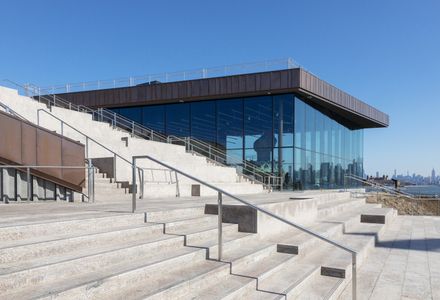
Statue Of Liberty Museum
INTERIOR DESIGNER
Jensen Hughes
STRUCTURAL ENGINEER
DeSimone Consulting Engineers
LIGHTING DESIGN
George Sexton Associates
AREA
75000 ft²
ACOUSTICS
Longman Lindsey
VERTICAL TRANSPORTATION
Van Deusen & Associates
LANDSCAPE ARCHITECT
Quennell Rothschild & Partners
CONSTRUCTION MANAGER
Phelps Construction Group
PROJECT MANAGEMENT
SBI Consultants Inc.
SECURITY / IT
TM Tech Partners
SUSTAINABILITY / LEED
Atelier Ten
HISTORIC PRESERVATION
Li/Saltzman Architects
CODE
Jensen Hughes
ACCESSIBILITY CONSULTING
Jensen Hughes
CODE CONSULTING
Jensen Hughes
MEP ENGINEER
Kohler Ronan Consulting Engineers
ARCHITECT (DESIGN ARCHITECT & ARCHITECT OF RECORD)
FXCollaborative
CODE & ACCESSIBILITY CONSULTING
Jensen Hughes
CIVIL ENGINEERING
Langan Engineering & Environmental Services
EXPERIENCE AND EXHIBITION DESIGN
ESI Design
LOCATION
Liberty Island, New York, United States
ENHANCING THE VISITOR EXPERIENCE ON LIBERTY ISLAND
FXCollaborative set two goals for the design of the Statue of Liberty Museum: 1) To create a building that uplifts the experience of the island for all visitors, and 2) To extend and add to the island’s open space, which is a UNESCO World Heritage Site and home to a beloved international monument.
The Statue of Liberty Museum is a garden pavilion that is designed to welcome all visitors of all ages, nationalities, and ethnicities.It is located at the north end of the formal pedestrian mall on Liberty Island, facing the Statue of Liberty and slightly rotated away from it.
The museum anchors the main axis that connects the Museum to the Statue, and extends this axis via a sweeping granite staircase that leads to its roof.
The visitor experience culminates in a dramatic granite roof terrace that provides unobstructed views of Lady Liberty, the Manhattan skyline, and New York Harbor.
The design eschews formality in favor of an asymmetrical design that embraces its dramatic setting and changes form as visitors move in, on, and around it, much as the idea of liberty is a diverse and pluralistic concept.
The project’s angular plan and rich variety of spaces allow visitors to enjoy a broad view of the island and New York Harbor.
The design eschews formality in favor of an asymmetrical design that embraces its dramatic setting and changes form as visitors move in, on, and around it, much as the idea of liberty is a diverse and pluralistic concept.
The project’s angular plan and rich variety of spaces allow visitors to enjoy a broad view of the island and New York Harbor. Its dynamic expression was inspired by the irregularity of the water’s edge, as well as the geometry of the circular Flagpole Plaza.
The resulting form creates a visual counterpoint to Fort Wood at the base of the Statue, which bookends the far end of the mall.
Both the Fort and Museum have acute corners; whereas the Fort turns inward, the museum radiates outward, celebrating freedom.
MERGING BUILDING AND LANDSCAPE
The design merges building and landscape. The building responds to the layout of the island, which is based on French formal garden traditions, and establishes a naturalized landscape that is “lifted” above the formal mall.
Its steps, terraces, and roof extend the park and the perimeter esplanade above the ground plane to carry visitors onto the site, creating a new visitor environment for viewing, resting, and picnicking.
The planted roofs incorporate native vegetation that super-insulates the building by capturing and filtering stormwater.
Around the building, the grounds are planted with native meadow grasses that create a natural habitat for wildlife and migrating birds.
The building’s elevation above the 500- year flood plain prevents damage from extreme weather events, such as Hurricane Sandy, which shut down power on the Island in 2012. The museum emerges as a new geology that is deeply integrated with nature.
























